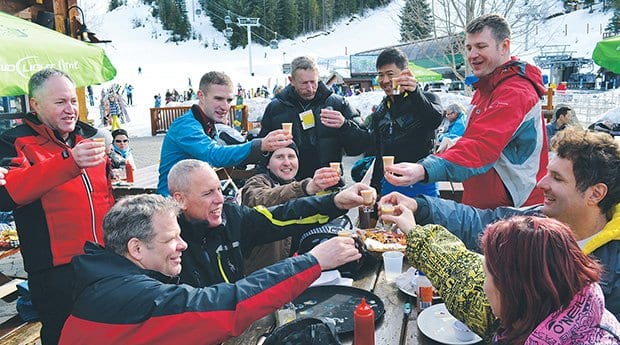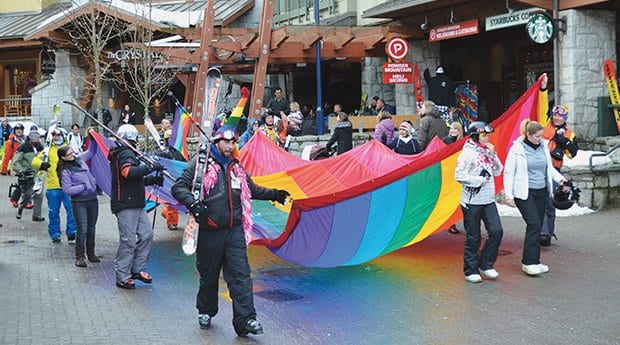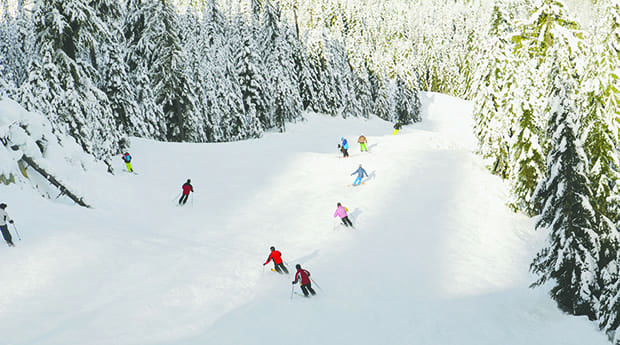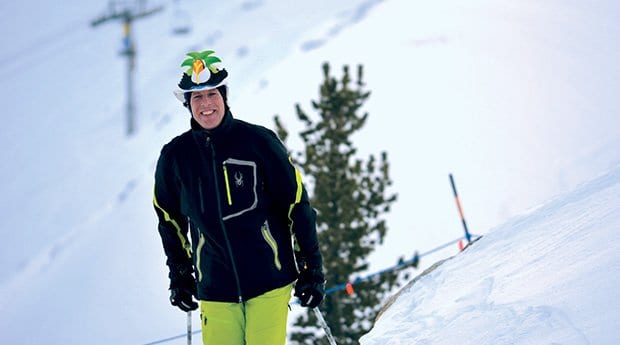
"It's the atmosphere and skiing on a mountain, and it's the companionship," says WinterPride ski guide Michael Muller, surrounded by his charges for the day.. Credit: Niko Bell photo

Carrying the rainbow through Whistler village, Feb 7. Credit: Niko Bell photo

"You can get out and have a healthy, exciting activity that isn't a usual Pride activity. But it is a Pride activity, because we've owned it," says WinterPride organizer Dean Nelson. Credit: Niko Bell photo
We are halfway down Whistler Mountain, and ski guide Michael Muller has lost all but one of his skiers.
Muller and I slipped down a chute hedged by cliffs and dense pine trees and find ourselves alone in this silent, snow-pillowed glade. The only sound is Muller’s growling purr from underneath his flamboyant toucan hat as he mutters,
“Where did they go? Where did they go?”
Muller is a 21-year veteran of Whistler’s Gay Ski Week; he knows the value of sticking together. “Growing up and being gay in the ’80s was not exactly easy, and WinterPride morphed out of that,” he told me on the lift ride up to the peak.
Back then, only a couple hundred people showed up every year. They would wear whistles on red lanyards as a way of communicating on the mountain.
“You would toot your whistle, and if you heard another whistle, you would know another gay guy was around.” Those were the days when Muller and his friends were kicked out of Tommy Africa’s Nightclub for dancing shirtless.
Now, WinterPride has grown to about 3,000 guests every year, and the clubs openly compete for gay dollars. “It used to be a small, intimate affair,” Muller says. “I remember parties where you actually got to meet people and you saw them every day. Now it’s a rather larger affair, but I find there are groups where you still have that cohesion, that brotherhood.”
Muller comes back every year for that feeling of family. That is how he treats his skiers. Whenever we regroup, Muller knows exactly who is missing before anyone else does, even though he just learned our names today.
Above and to our left, Tim Smith and Jason Ritchie come into view, picking their way through the trees on the far side of the cliff face. We wave as they glide by. Two more accounted for.
Smith and Ritchie are a younger generation than Muller, drawn by the worldwide community of gay skiers that forms every year in Whistler. “I have so many friends all over the world, and all over the US, too, and I met them all through skiing. I met a lot of them here,” Ritchie tells me. In our group alone, we have visitors from the United States, South America, Europe and Australia.
Smith and Ritchie also come for the parties; an impressive circuit has grown up around Gay Ski Week. That’s where Ritchie, from Minnesota, met Tim, from Oregon. After they ran into each other at a party at the Buffalo Bill Saloon, they were “joined at the hip,” Ritchie says. They have been dating long distance ever since, and so it was natural to meet up back at the mountain.
WinterPride is a strange mix: part gay sporting event, part Pride celebration, part circuit party and part community gathering. But that is all part of the plan for Dean Nelson, the spindle of soft-spoken charismatic energy in a grey tweed jacket who quit his job and re-mortgaged his house to save WinterPride from the brink of destruction seven years ago.
Nelson is a veteran of Whistler’s tourism industry and knows that he has to bring in whomever he can to keep the festival alive.
“It’s a huge battle,” he says. “Skiing is obviously very important as a keystone of the festival, but we’re always looking to engage new people who might not come to a ski resort.” Nelson brought the Mr Gay Canada competition to Whistler and dreams of adding a film festival as well.
Every year he works for months after the festival compiling an economic impact report to justify the festival’s existence. The more hotel beds he fills, the more secure WinterPride will become. The Municipality of Whistler is loud in its support of WinterPride but quietly decided this year not to supply any funding. The festival still lives on the edge, Nelson says.
“You know, if there’s a bad year with the dollar, or airlines are going crazy, or the weather is going crazy, and people don’t buy the tickets, we could go bust,” he says. “It’s a real high risk.”
As Smith and Ritchie sail by into the valley below us, an unmistakable bright-pink jacket appears through the trees. It belongs to Vivian Van de Perre, a Dutch native who lives in New York. She is the only woman in our group of nine skiers, about the same proportion as in all of WinterPride. Like many of the other women, she is also here for the first time.
“I’m only discovering this now, and it’s wonderful. It’s great to ski with a group and have a guide who knows what he’s doing,” she tells me on the lift. “It’s much more fun than just skiing with one or two.”
Van de Perre loves the skiing, but like many other women she is less interested in the parties and drinking that make up traditional nights in the village. This year, Nelson brought in organizers from the Vancouver Dyke March to try to make the festival more appealing to gay women.
“In the gay community there tend to be events that are more male-focused . . . and I think this just happens to be one of them,” says Theresa Wilson, president of the Dyke March board of directors. Along with more traditional party events, Wilson has added lesbian speed dating, burlesque, karaoke and even board games — all of which, she says, have been wildly popular.
Many of the women coming to WinterPride, however, are like Van de Perre. She came to the festival through the same network of old WinterPride veterans; she heard about it from a gay male friend who has been coming for years.
I asked dozens of people at WinterPride why they come back, and again and again I heard the same thing that I heard from Muller: “It’s the atmosphere and skiing on a mountain, and it’s the companionship,” he told me. “I think people just like to be with other people who they can be comfortable with, who they share something in common with.”
Nelson confirms that, for the most part, the same people come back year after year. His research shows that about 75 percent of attendees have been at WinterPride more than four years, and about 30 percent have been here more than 10.
“It’s the same crowd; we’ve just gotten older,” laughs David Keen, the owner of the South Side Diner. He sold drinks to the first group of gay skiers here 21 years ago, before he was even openly gay. The older crowd, he says, is what keeps WinterPride alive.
“Having that kind of loyalty is very important to us,” Nelson says. “It creates global ambassadors. Every year, they’re bringing more people. It creates a community. It’s like homecoming. It’s that family connection that you all dream about. It’s pretty magic.”
It’s ski guides like Muller who are the heart of that community, Nelson continues. “You can get out and have a healthy, exciting activity that isn’t a usual Pride activity. But it is a Pride activity, because we’ve owned it. It’s our ski guide program, and it’s our thing that you can do besides just drinking.”
“For those of us on the mountain, the core of it is still about skiing,” Muller says. “And we still feel that guiding is the core of it as well; it brings people together. And that’s good.”
It isn’t until the last skier has emerged from the trees that Muller swoops down to join them in the valley, where we laugh and tell our stories of escaping from the cliff face.
“Well, it’s a straight run down from here,” Ritchie says, with some relief.
“Oh no,” rumbles Muller, grinning at us. “I’ve got something else up my sleeve.”


 Why you can trust Xtra
Why you can trust Xtra


